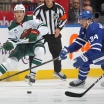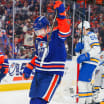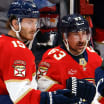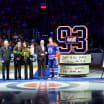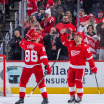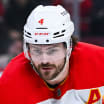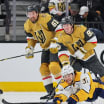NHL teams turn focus to free agency with 2022 Draft complete
Plenty of big names, limited cap space makes for drama ahead of market opening Wednesday
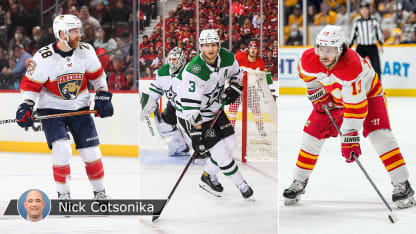
Teams headed home to prepare for the opening of the market Wednesday, some trying to keep their players, others waiting to pounce on targets, all operating under an NHL salary cap that will rise $1 million to $82.5 million next season.
"You just look through the League and look at the different positions, players that had great playoffs, what they've done," Dallas Stars general manager Jim Nill said. "It's a good free-agent class."
Many big-name players could become unrestricted, including forwards Patrice Bergeron, Claude Giroux, Johnny Gaudreau, Nazem Kadri, Phil Kessel, Ondrej Palat and Evgeni Malkin; defensemen John Klingberg, Nick Leddy, Josh Manson and P.K. Subban; and goalies Jack Campbell, Thomas Greiss, Braden Holtby and Darcy Kuemper.
"Certainly, when you look at the potential free agents, they're not free agents yet," Carolina Hurricanes GM Don Waddell said. "It looks like there is an abundance of forwards, not as many defensemen."
The key complication is the salary cap, which is tied to NHL revenues that are split 50-50 between the owners and players. The cap is rising slowly (though commonly called a "flat cap") because of revenue shortfalls amid the COVID-19 pandemic.
"It seems like most of the talk is it's too bad the cap is going up only a little bit," New York Rangers GM Chris Drury said. "Everyone is dealing with the same thing, but it's obviously a good class."
Minnesota Wild GM Bill Guerin couldn't help but laugh.
"Yeah, there's tons of teams that are close against the cap, and I think a lot of the agents don't realize that 25 teams are against the cap," said Guerin, who signed goalie Marc-Andre Fleury on Thursday to keep him off the market. "Like, there's not a lot of money to go around. The salary cap hasn't gone up. It's going up a million dollars, and that goes quick."
Teams can try to get ahead of the market. The Detroit Red Wings acquired goalie Ville Husso, a pending unrestricted free agent, in a trade from the St. Louis Blues for the No. 73 pick on Friday and signed him to a three-year contract.
Teams can try to clear cap space so they can make a move, like the Toronto Maple Leafs did when they sent goalie Petr Mrazek and the No. 25 pick to the Chicago Blackhawks for the No. 38 pick on Thursday.
That could continue in the coming days.
"You could definitely see it," Guerin said. "I mean, teams are doing everything in their power to get cap space and things like that."
But in many cases, it may become a game of musical chairs. If a player leaves a team to sign elsewhere, that opens cap space for that team to sign someone else.
Take the Pittsburgh Penguins. They would like to bring back Malkin, at least at what they consider the right price. He is one of the greatest players in their history, along with Mario Lemieux, Jaromir Jagr and Sidney Crosby. But if he leaves, they will have to fill the hole at center behind Crosby, and they will have the money to spend to pursue a player like, say, Kadri, if he becomes available.
"It's like putting a puzzle together, right?" said Penguins GM Ron Hextall, who had defenseman Kris Letang agree to a six-year contract Thursday to keep him off the market. "Until you get another piece in place, it's really hard to find your direction. Hopefully we can lock 'Geno' in and see what we have left and work from there."
The wild cards are teams with cap space like the Red Wings, Anaheim Ducks, Arizona Coyotes, Buffalo Sabres, New Jersey Devils and Seattle Kraken.
"We're all trying to get better," Nill said. "It's a competitive league, and teams are trying to move out money to maybe sign a free agent, but where does that player go that they're going to move?
"In the end, you've got 25, 26 teams up against the cap and six or seven that aren't, and to what magnitude do those get involved? Do they start picking up players in trades? Do they go to the free agent market? That's going to be the interesting dynamic."
Nill said free agency might play out a little differently this year because of it.
"This might be a year where it drags on a little bit longer," Nill said. "It might not be a rush of everybody getting signed on [Wednesday]. There's always going to be the rush of certain players that will get signed, but because of the tight cap situation, are there going to be other situations that take place after that?"
We'll find out next.
"There is money to be spent, and players are going to make a lot of money in free agency, which they always do," Waddell said. "The system works. That's what's good about it. The cap works. Players' salaries continue to rise, but the owners' share continues to go in the same direction, so it's a win-win for everybody."
NHL.com senior writer Dan Rosen contributed to this report




